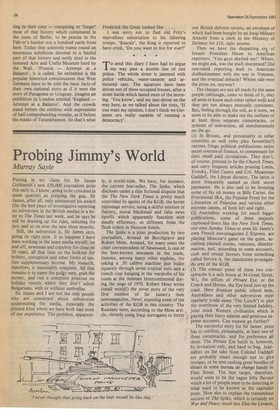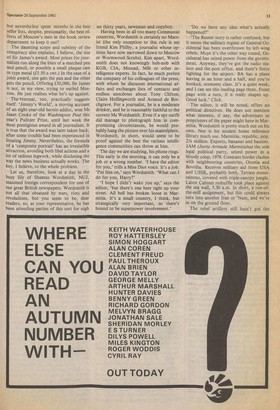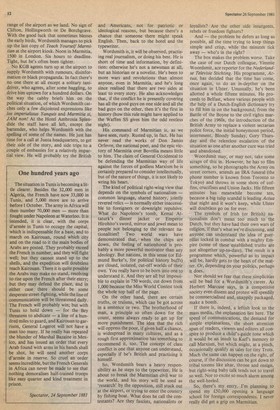Probing Jimmy's World
Murray Sayle
Putting in my claim for Sir James Goldsmith's new 00,000 journalism prize this early is, I know, going to be criticised in some quarters as jumping the gun. Sir James, after all, only announced his award (for the best piece of investigative reporting on subversion in the British media) in a letter to The Times last week, and he says he will be drawing up the rules, selecting the jury and so on over the next three months.
Still, the subversion is, Sir James says, going on right now. It so happens I have been working in the same media myself, on and off, newsman and copyboy for close on 30 years, all that time on the lookout for bribery, corruption and other forms of taxfree supplementary income. My research, therefore, is reasonably complete. All that remains is to name the guitty men, grab the money, and run a computer printout on holiday resorts where they don't admit Bulgarians, with or without umbrellas.
Sir James and I are not the only people who are concerned about subversives undermining the media, especially the printed kind where we have both had most of our experience. The problem, apparent ly, is world-wide. We have, for instance, the current best-seller, The Spike, which discloses under a thin fictional disguise that the The New York Times is pretty much controlled by agents of the KGB, the Soviet espionage service, using a skilful mixture of flattery, moral blackmail and false news tipoffs which apparently function with deadly efficiency, so different from the flush toilets in Moscow hotels.
The Spike is a joint production by two journalists, Arnaud de Borchgrave and Robert Moss. Arnaud, for many years the chief correspondent of Newsweek, is one of the best-known newsmen in the trade, famous, among many other exploits, for taking a .50 calibre machine gun bullet squarely through seven tropical suits and a trench coat hanging in the wardrobe of his room at the Amman Intercontinental during the siege of 1970. Robert Moss wrote (small world!) the cover story of the very first number of Sir James's then newsmagazine, Now!, exposing some of the activities of the KGB in this country. The Russians were, according to the Moss article, cleverly using Iraqi surrogates to ferret out British defence secrets, an envelope of which had been bought by an Iraqi Military Attache from a clerk in the Ministry of Defence for £10, sight unseen.
Then we have the despairing cry., of former President Nixon to American reporters: 'You guys shafted me!' Where, we might ask, was the shaft sharpened? Did one-sided reporting lead to American disillusionment with the war in Vietnam, and the eventual debacle? Whose side were the press on, anyway?
The charges are not all made by the same people (although, come to think of it, they all seem to know each other rather well) and they are not always mutually consistent. But, feeling through the veil, as it were, we seem to be able to make out the outlines of at least three separate conspiracies, or systems of subversion, all simultaneously on the go.
(1) In Britain, and presumably in other countries as well (why play favourites?) various fringe political publications enjoy secret sources of finance, to compensate for their small paid circulations. They don't, of course, pretend to be the Church Times, and carry frequent articles praising Lenin, Trotsky, Fidel Castro and Col. Muammar Gaddafi, the Libyan dictator. The latter is most frequently named as their secret paymaster. He is also said to be investing some of his oil money in Billy Carter, the Provisional IRA, the Popular Front for the Liberation of Palestine and various other extreme causes, of both left and right.
(2) Journalists working for much bigger publications, some of them majestic cupboard-liners like the New York Times, our own Sunday Times or even Sir James's own French newsmagazine L 'Express, are playing Moscow's game on the quiet, accepting planted stories, rumours, disinformation, and, according to some accounts, cash and sexual favours from something called Service A, the clandestine propaganda arm of the KGB.
(3) The contact point of these two conspiracies is a safe house at 34 Greek Street, WI, the offices of Private Eye, or the Coach and Horses, the Eye local just up the road. Here drunken public school men, Australians and other subversives meet regularly (code name 'The Lunch') to plot the overthrow of the very limited liability, joint stock Western civilisation which is paying their fancy salaries and generous expense accounts. Can treason go further?
The successful entry for Sir James' prize has to confirm, presumably, at least one of these conspiracies, and for preference all three. The Private Eye lunch is, however, by invitation only, and hard to bug. Journalists on the take from Colonel Gaddafi are probably smart enough not to give receipts, or be seen cashing great bundles of dinars in some bureau de change handy to Fleet Street. The best target, therefore, would seem to be the vague lefty flavour which a lot of people seem to be detecting in what used to be known as the capitalist press. How else to explain the tremendous success of The Spike, which is certainly no War and Peace, much less Elsa the Lioness, but nevertheless spent months in the best seller lists, despite, presumably, the best efforts of Moscow's men in the book review department to keep it out?
The daunting scope and subtlety of the conspiracy also explains, I believe, the size of Sir James's award. Most prizes for journalism run along the lines of a matched pen and pencil, or possibly a small plaque cast in type metal (£5.50 a cwt.) In the case of a joint award, one gets the pen and the other gets the pencil. Offering £50,000, Sir James is not, in my view, trying to outbid Moscow. He just realises what he's up against.
The +format, too, practically suggests itself. 'Jimmy's World', a moving account of an eight-year-old heroin addict, won Ms Janet Cooke of the Washington Post this Year's Pulitzer Prize, until last week the most prestigious award in all journalism. It is true that the award was later taken back, after some trouble had been experienced in locating Jimmy. Nevertheless, the formula of a 'composite portrait' has an irresistible attraction, avoiding both libel actions and a lot of tedious legwork, while disclosing the way the news business actually works. The key, I believe, to the whole problem.
Let us, therefore, look at a day in the busy life of Shamus Wordsmith, NUJ, seasoned foreign correspondent for one of our great British newspapers. Wordsmith is not all that obsessed by wars, riots and revolutions, but you seem to be, dear readers, so, as your representative, he has been attending parties of this sort for nigh on thirty years, newsman and copyboy.
Having been in all too many Communist countries, Wordsmith is certainly no Marxist (the only exception to this rule is my friend Kim Philby, a journalist whose options have now narrowed down to Moscow or Wormwood Scrubs). Kim apart, Wordsmith does not knowingly hob-nob with KGB, CIA, Mossad, MI6 or other intelligence experts. In fact, he much prefers the company of his colleagues of the press, with whom he discusses international affairs and exchanges lists of contacts and endless anecdotes about Tony Clifton, Claire Hollingworth and Arnaud de Borchgrave. For a journalist, he is a moderate drinker, and he is reasonably faithful to the current Ms Wordsmith. Even if a spy outfit did manage to photograph him in compromising circumstances, he would probably hang the picture over his mantelpiece. Wordsmith, in short, would seem to be proof against the best the various intelligence communities can throw at him.
The day we are studying, his phone rings. This early in the morning, it can only be a job or a wrong number. 'I have the editor for you,' trills a Miss Dior voice. It's a job. 'Put him on,' says Wordsmith. 'What can I do for you, Harry?'
'I hope I didn't wake you up,' says the editor, 'but there's one here right up your street. All hell has broken loose in Marmitia. It's a small country, I think, but strategically very important, so there's bound to be superpower involvement.' 'Do we have any idea what's actually happened?'
'The Reuter story is rather confused, but it seems the military regime of General Occidental has been overthrown by left-wing rebels. Maye it's the other way round, Occidental has seized power from the government. Anyway, they've got the radio station and the post office, and there's fierce fighting for the airport. BA has a plane leaving in an hour and a half, and you're booked, economy class. It's a quiet week, and I can see this leading page three. Front page with a turn, if it really shapes up. Good luck.' Click.
The editor, it will be noted, offers no political directives. He does not mention what interests, if any, the advertisers or proprietors of the paper might have in Marmitia. Wordsmith is pretty much out on his own. Nor is his modest home reference library much use. Marmitia, republic, pop. 23/8 million. Exports, bananas and bauxite. JAM (Junta Armada Marmitiana) the sole legal political party, seized power in a bloody coup, 1978. Constant border clashes with neighbouring countries, Oxonia and Bovrilia. Receives military aid from USA and USSR, probably both. Terrain mountainous, covered with triple-canopy jungle. Latest Cabinet reshuffle took place against the sea wall, 5.30 a.m. In short, a run-ofthe-mill assignment, but this could always turn into another Iran or 'Nam, and we're in on the ground floor.
The rebel artillery still hasn't got the range of the airport as we land. No sign of Clifton, Hollingworth or De Borchgrave. With the good luck that sometimes blesses the early birds, Wordsmith manages to pick up the last copy of Teach Yourself Marmitian at the airport kiosk. Noon in Marmitia, 1500 in London. Six hours to deadline. Tight, but he's often been tighter.
No KGB agents turn up at the airport to supply Wordsmith with rumours, disinformation or black propaganda. In fact there's no one there at all except a solitary taxidriver, who agrees, after some haggling, to drive him uptown for a hundred dollars. On the way the cabby briefs him on the political situation, of which Wordsmith catches only a few disjointed expressions like los imperialistas Yanquis and Marmitia Si, JAM non! At the Hotel Ambrosia Splendide the staff have all left, except the bartender, who helps Wordsmith with the spelling of some of the names. He just has time for a call at Junta headquarters, to get their side of the story, and side trips to a couple of embassies for a relatively impartial view. He will probably try the British and Americans, not for patriotic or ideological reasons, but because there's a chance that someone there might speak English. Then, back to the hotel and the typewriter.
Wordsmith is, it will be observed, practising real journalism, or doing his best. He is short of time and information, by definition: otherwise he's not a newsman at all, but an historian or a novelist. He's been to more wars and revolutions than almost anyone, even in Marmitia, and he's long since realised that there are two sides at least to every story. He also acknowledges that, if the conflict he is presently covering has all the good guys on one side and all the bad guys on the other, then it's the first in history (how this rule might have applied to the Waffen SS gives him the odd restless night).
His command of Marmitian is, as we have seen, rusty. Rusted up, in fact. He has never read the works of Don Jamio Orfevre, the national poet, and the epic victory of Marmitia over Bovrilia means little to him. The claim of General Occidental to be defending the Marmitian way of life against the forces of godless Marxism he is certainly prepared to consider intellectually, but of the nature of things, it is not likely to wring his heart.
The kind of political right-wing view that depends on the symbols of nationalism — common language, shared history, jointly revered relics — is normally either inaccessible to foreigners or downright repulsive. What do Napoleon's tomb, Kemal Attaturk's dinner jacket or Emperor Hirohito's sword, mirror and jewel mean to people not belonging to the relevant nationalities? Two world wars have demonstrated that, when the chips are down, the feeling of nationhood is probably a more powerful motivator than any ideology. But nations, in this sense (or Edmund Burke's, for political history buffs) are closed, isolated, cut-off worlds of their own. You really have to be born into one to understand it. And they are all but impossible to explain in 750 words, cut down from 1,000 because the Miss World Contest took the whole top half of the page.
On the other hand, there are certain truths, or truisms, which can be got across in a sentence or two. The brotherhood of man, a principle so often down for the count, seems always ready to get up for more punishment. The idea that the rich will oppress the poor, if given half a chance, is widespread in many cultures, and as a rough first approximation has something to recommend it, too. The concept of class conflict is one that anyone can understand, especially if he's British and practising it himself.
So, Wordsmith bears a heavy responsibility as he steps to the typewriter. He is about to break the Marmitian civil war to the world, and his story will be used as 'research' by the opposition, still stuck out at the airport, or trying to enter the country by fishing boat. What does he call the contestants? Are they fascists, nationalists or loyalists? Are the other side insurgents, rebels or freedom fighters?
And — the problem he defers as long as possible, all the time trying to keep things simple and crisp, while the minutes tick away — who's in the right?
The box makes the problem worse. Take the case of our Dutch colleague, Yimmie Woordsmit, ace reporter for the Nederlandse Televisie Stichting. His programme, Actua, has decided that the time has come, once again, to do an in-depther on the situation in Ulster. Unusually, he's been allotted a whole fifteen minutes. He proceeds to Belfast, where various people with the help of a Dutch-English dictionary try to fill him in on the background, from the Battle of the Boyne to the civil rights marches of the 1960s, the introduction of the British Army to replace a violent sectarian police force, the initial honeymoon period, internment, Bloody Sunday, Gory Thursday and the relentless escalation of the situation as one after another cure was tried and abandoned.
Woordsmit may, or may not, take some scraps of this in. However, he has to film something, so he photographs the Army on street corners, attends an IRA funeral (the phone number is known from Toronto to Tokyo) and throws in some shots of coffins, crucifixes and Union Jacks. His fifteen minutes has meanwhile become ten, because a big tulip scandal is leading Actua that night and it won't keep, while Ulster will doubtless go on for ever.
The symbols of Irish (or British) nationalism don't mean too much to the Dutch, but they have had their own wars of religion, if that's what we're discussing, and anyone can understand the idea of guerrillas locked in combat with a mighty Empire (some of these established truths are not altogether up-to-date). The result is a programme which, powerful as its impact will be, hardly gets to the heart of the matter. Or, depending on your politics, perhaps it does.
Nor should we fear that these simplicities will be bad for a Wordsmith's career. As Herbert Marcuse says, in a competitive society even dissent and protest will speedily be commercialised and, snappily packaged, make a bomb.
If there is, indeed, a leftish look to the mass media, the explanation lies here. The speed of communications, the demand for simple explanations, the short attention span of readers, viewers and editors all conspire to produce a child's-guide tone which it would be an insult to Karl's memory to call Marxism, but which might, at a pinch, occasionally qualify as tales for tiny Trots. Much the same can happen on the right, of course, if the discussion can be got down to tribal totems like altar, throne and ensign, but right-wing baby talk tends not to travel so well. Nor to excite so much alarm among the well-heeled.
So, there's my entry. I'm planning to spend my 00,000 opening a language school for foreign correspondents. I never really did get a grip on Marmitian.




































 Previous page
Previous page